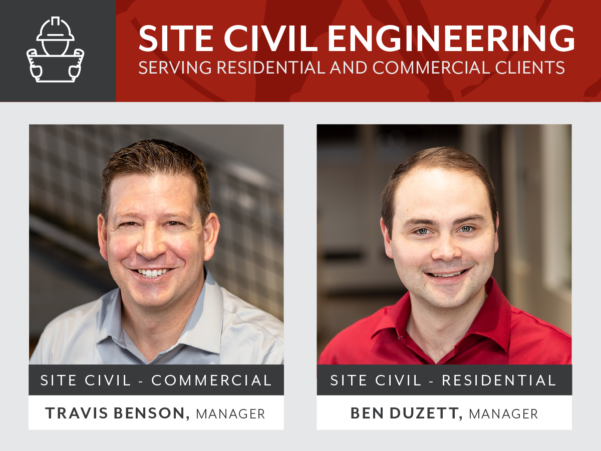
Specialized Site Civil Departments Meet Unique Client Needs
When Ron Paul founded Focus Engineering & Surveying in 2007, providing civil engineering for residential development projects was the firm’s bread and butter. Fast forward to 2021 and the full-service engineering and surveying firm has evolved into an industry-leading powerhouse that specializes a wide variety of both residential and commercial development projects, including office buildings, apartments and townhomes, retail shops, master-planned communities, and UDOT projects.
Ever committed to customer service, FOCUS leadership heightened its attention on what is required for its clients to be successful. Leadership determined the best way to truly meet client needs and expectations was to provide two distinct departments with experts who fully understand and specialize in either commercial or residential development.
Travis Benson now heads the Site Civil Commercial department and Ben Duzett leads the Site Civil Residential department.
While the need to distinguish between the two types of development may seem minor, the opportunity to continually improve on the product we provide and the increase the level of customer service made the decision an easy one.
How Residential and Commercial Developments Differ
One of the major differences in designing a residential versus a commercial project is the fact that grading, earthworks, storm drain, and sewer design are driving design factors for a planned residential development. With a commercial project, including apartments and townhomes, engineering design starts with accessibility requirements prescribed by the Americans with Disabilities Act (ADA).
Another differentiator is the size of a project. Residential developments are often much larger than commercial site plans. A residential project typically has many phases and requires master utility planning and an understanding of the big picture when it comes to grading and earthwork. “We could make a design decision that creates a domino effect that isn’t seen for a couple of years,” explains Ben. “When we understand the big picture, we help our clients avoid problems down the road.”
Engineering for Residential Development
Understanding these nuances helps the residential department home in on processes to reinforce the design objectives of residential development. For example, the team understands the significant cost associated with earthwork and has developed and refined home construction and development grading plans so developers can save money on dirt work. “We actually grade in a home footprint to ensure the grading and drainage is going to work when the home is built on the lot,” Ben shares. The development grading process includes figuring out where to partially dig out the basements so when they construct the home on the lot, the contractor doesn’t have to bring in or haul off a large amount of dirt.
Engineering for Commercial Development
While a commercial site plan normally includes one or only a few buildings, the building type and user definition is broad. The commercial department creates solutions for office buildings, schools, and apartments as well as retail, medical and industrial buildings. These projects typically demand more coordination and meetings with an architect and subconsultant team.
A first-of-its-kind project like Soleil Lofts benefitted from the expertise of the commercial development team. The 600-unit project is a unique partnership between Wasatch Premier Communities and Rocky Mountain Power and is Utah’s first all-electric community. When initially given the concept plan, FOCUS recognized the general layout and configuration of the site would not work. Trusting our understanding of terrain and familiarity with this project type, the owner asked the commercial team to re-layout the site. The resulting plan was one the client and architect used.
Maintaining Quality and Consistency
The two departments may have different client focuses but the standards for quality and consistency remain the same. “While there are small variations between the groups to meet different design needs, we include individuals from both teams on our standards committee,” says Travis. This committee meets regularly to address concerns with and brainstorm innovative solutions for design and deliverables to ensure we are maintaining consistency.
Because we know markets change and we must be able to meet the demands of both commercial and residential projects, FOCUS leadership regularly engages both departments in training to expand our understanding and knowledge of both disciplines. This well-rounded approach serves to help young engineers gain a solid understanding of general design while specializing and focusing in a specific discipline.
Travis and Ben are excited about the potential for members of our firm to grow in experience and expertise as we adapt our services to meet client needs.
